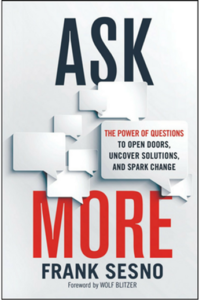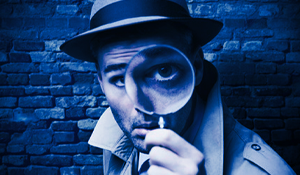By Jamie Murdock on 3/13/18 4:38 PM
Questions bubble up for event professionals all the time, but many go unasked even when they can lead to event improvements...
- A high performing team is critical to the success of all events, yet we may not ask how the team is doing or what their opinion is to help make the event even better.
- When designing events, scant survey data and wrong assumptions guide many design decisions. The experiences attendees crave are shifting, but we forget to ask how or why.
- Speakers invest hours and hours to design their presentations – then tack on Q&A at the end thinking this will make their session interactive. Frustrated attendees exit without sharing why.
- Sponsorship sales teams leap to the sponsorship grid too soon, asking sponsors to choose from columns A, B or C without first asking what goals they're striving to achieve.
- Ditto for signing on and renewing exhibitors. Some jump to the booth pitch without asking which buyers these investors most want to see.
We need to ask more questions, but we need to be more purposeful in our approach. We need to pose the right questions, to the right people, at the right time. Then we need to hit our pause button and listen intently, to make sure we understand what's being shared and even more importantly, how it's being shared (non-verbals can be very telling).
Why do we need to ask more questions?
In my role as a sales team leader, questions are at the core of everything we do. We're uncovering complex event challenges and probing further to understand the full scope of considerations, so we can recommend the best possible solution options.
As we investigate, often there are hidden details lurking below the surface – details not typically revealed in an RFP. To make things even more challenging, sometimes there are executives who will influence purchasing decisions, yet they don't appear until the final round of discussions.
Suddenly, new clues emerge that might alter the solutions we recommend. For this reason, we launched a survey to flesh out these clues sooner. These surveys are helping and there's one question in particular, that's teeing up more fruitful discussions:
"If you could wave a magic wand, what would your ideal provider help you accomplish?"
While event organizers invest much time to create detailed RFPs, they don't always know the full scope of what's possible, especially in light of technology advancements. They're looking at this situation through their own lens and often cognitive biases can disrupt an otherwise sound, decision-making process. If this is the case, it would be beneficial for them to look for companies that offer rfp support so they can ensure all details are included.
Remember that classic Henry Ford quote?
"If I had asked people what they wanted, they would have said faster horses."
Here we are, nearly a century later and that quote still rings true.
As I explored the art and science of question strategies a bit more, I found a book with valuable insights that span beyond the sales realm. Insights event organizers and sales professionals can use to improve nearly every aspect of their events or opportunities.
Ask More: The Power of Questions to Open Doors, Uncover Solutions, and Spark Change
This best-selling book, authored by Emmy-award-winning news journalist Frank Sesno, outlines eleven question strategies, each linked to a specific set of outcomes. Some help to break down barriers or uncover secrets, while others help us to imagine new ways of solving complex problems. Each chapter explores a different question strategy, with fascinating stories about how others, famous and not-so-famous, have successfully applied these techniques to uncover valuable information or foster stronger relationships.
 Here are a few question categories that apply well to the events industry:
Here are a few question categories that apply well to the events industry:
- Diagnostic Questions – "Something's Not Right"
A favorite category for doctors and auto mechanics, as they explore history and trends that might be causing the problem. Sesno refers to this as the ground floor for questioning, as each answer often sparks new questions. This strategy is effective in sales conversations, but also good for nearly any other scenario. Keep in mind, "Tell me more" might be your best non-question to ask. - Empathy Questions – From the Inside Out
Terry Gross, host of NPR's "Fresh Air" is someone Sesno calls out as a master at using empathy questions to dig deeper and connect with her radio guests. Empathy questions go for the feeling, as we step into the shoes of someone else and look at the situation from their perspective. Laser sharp listening skills are crucial when engaging this strategy, but Sesno also recommends balancing that with "intimate distance." You need to be empathetic, yet be comfortable with silence, as these questions might probe painful challenges and the subject may need time to reflect before they can respond. In the events realm, empathy questions might be in order for conversations with disgruntled customers (attendees, exhibitors, or sponsors), but also work well for one-on-one coaching conversations with your team. - Creativity Questions – Imagine This
This strategy is a best fit when you need to help others move beyond their familiar day-to-day routine, as you brainstorm for new and sometimes unconventional solutions. Greg Bogue, chief experience architect at Maritz Global Events is a master at applying creative questioning techniques in the Experience Design Labs he facilitates with event organizers. If you're stuck and need to get unstuck, fire up the creativity questioning machine and you'll be amazed at what follows. As one who enjoys leading hackathons, this is one of my favorite questioning strategies. - Scientific Questions – Into the Unknown
We live in an age of instant answers. Not sure? We google to get answers, but what if those answers are wrong? And what if those wrong answers take us down the wrong path, draining precious resources? With scientific questions, we observe problems first, before framing our questions. We start by inventorying what can currently be known or measured objectively. Then we probe to figure out what's really going on – what we don't know, but need to know to solve this problem. With this technique, we put our hypotheses to the test, as we experiment, fine-tune, and measure results over time. This questioning technique often comes into play as we collect and analyze attendee behavioral data.
Relationships are built on dialogue. Productive dialogue happens when well thought out questions are asked and answered. Oftentimes, the answers spark more questions and even richer dialogue. Smart solutions are created around questions being asked and friends, teams, or customers answering them.
Humans are naturally curious, however we need to practice creating questions to expand our relationships and bring clarity to our challenges. We want to hear from you! Tell us what your favorite question is to ask and why.
Tweet me at @jamiemurdock74 and use #askmore18



comments